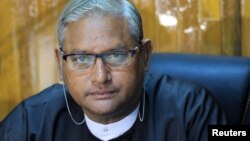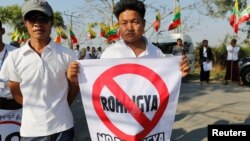Over the past five weeks, the public tributes to Ko Ni - a prominent legal adviser assassinated in Yangon on January 29 - have highlighted his many achievements.
The 63-year-old lawyer was a sharp legal mind, a tireless worker, a constitutional law expert and a staunch supporter of Myanmar’s transition to democracy after nearly five decades of military rule.
But the praise has glossed over his importance as a high-profile member of Myanmar’s Muslim community, one of its few remaining voices with any sway or influence in government circles.
While analysts have pointed to his work on reducing the military's influence through changes to the constitution as the most likely motive for the murder, his death has also widened the gap between Muslims and political life in Myanmar, prompting reflection on the shrinking space for civic participation from religious minorities in the largely Buddhist country.
“I can say the whole Myanmar history, like before the independence, after the independence, and then also for the changes of the military regime and also the revolution, every sector, Muslims are involved,” said 29-year-old Kyaw Htut, who helped organize a memorial in Yangon on Sunday for both Ko Ni and taxi driver Nay Win, who was killed trying to stop the suspected assassin as he fled the scene. “But today, U Ko Ni’s assassination is, I think, it is the notice for all of the Muslims, okay, you better stop from our history. I feel like that. It is really bad.”
Though making up only about 4 percent of the population, Muslims in Myanmar have long played important roles in political life. A Muslim politician, Abdul Razak, was assassinated along with Aung San Suu Kyi's father, Aung San, in 1947, and Muslims were active in the pro-democracy uprising in 1988.
But as the country opened up to the world in 2011, Buddhist nationalism flourished at the expense of religious minorities.
More than 120,000 ethnic Rohingya Muslims were placed in camps in western Rakhine state after inter-religious violence in 2012 killed hundreds. As Myanmar’s democratic elections loomed in 2015, election officials rejected the candidacy of a previously elected Rohingya lawmaker, citing dubious citizenship grounds.
Aung San Suu Kyi’s National League for Democracy (NLD) bowed to pressure from nationalist groups by not fielding any Muslim candidates for parliament. Those who ran for other parties lost in the wave of support for the NLD.
Today tens of thousands of Rohingya Muslims have fled to Bangladesh as Myanmar’s army rounds up anyone with ties to a little-known militant group that attacked a border post in October, killing nine. Rights groups have said abuses committed in the crackdown could amount to crimes against humanity, but Myanmar, which rejects the allegations, has resisted calls for an independent investigation.
As part of the investigation into Ko Ni’s murder, which is widely believed to have been motivated by politics rather than religion, authorities have arrested three people and are searching for a fourth suspect.
At the memorial on Sunday, which was held at the Royal Rose restaurant in Yangon, writer Htin Lin Oo, who spent more than a year in jail for a speech in 2014 deemed offensive to religion, commented on the slow erasure of Muslims from public life.
“In Buddhism, we have to pray for everyone, every single animal, even the water. But nowadays it’s sad to see that the nationalists want to remove U Ko Ni and U Mya Aye from the list of animals they have to pray for.”
Mya Aye is a Muslim member of the 88 Generation, a group of student activists who took part in the 1988 protests.
After the memorial, which involved several speeches, Rohingya activist Wai Wai Nu said Ko Ni’s murder – which she stressed was not directly tied to religion – was nevertheless an indirect “reminder” for the Muslim community that if you are outspoken, “you will be easily targeted.”
Wai Wai Nu herself has to be “strategic” in what she says online.
“Sometimes, I want to post something, I cannot. That can bring a lot of attention to you,” she said, adding that it can be the same for many other minority groups, not just Muslims.
But Aye Lwin, an interfaith advocate and one of the only Muslim members of an advisory commission on Rakhine State led by former U.N. secretary general Kofi Annan, said up and coming Muslim leaders could look at Ko Ni’s death another way, even as an “inspiration.”
“This will harden us,” he said. “Death cannot stop us.”









